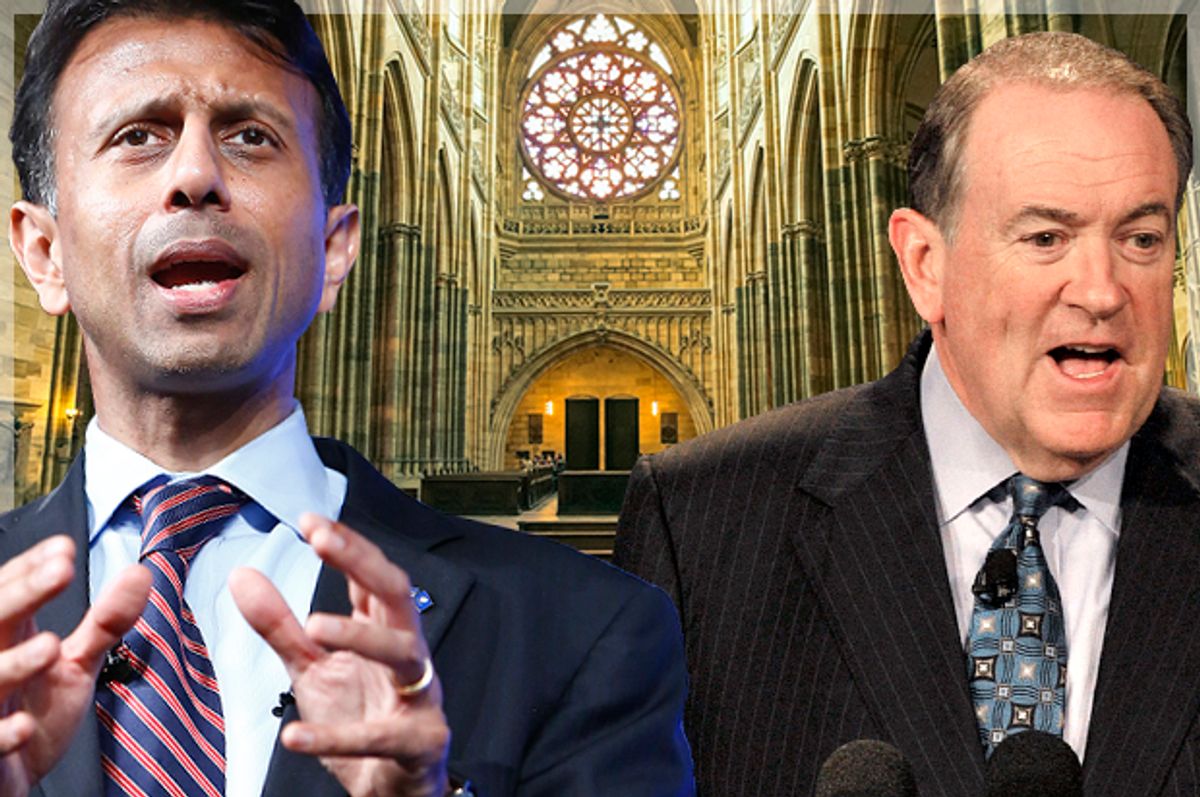When the Supreme Court decision in Obergefell v. Hodges came down and same-sex marriage was suddenly, finally legalized throughout the country, the response from social conservatives was loud and predictable: “What about our religious liberty?” We’ve seen versions of this fight play out time and again over the last few months and years as religious conservatives have sought to slow the rapid advance of gay rights by arguing that their constitutionally protected religious freedoms are threatened when the state makes it illegal to discriminate against gays. With the Obergefell ruling, the “religious liberty” crowd are facing their most challenging setback: If marriage equality for gays is now the law of the land, what can one do to protect one’s “religious freedom”?
Republicans like Ted Cruz and the Republican attorney general of Texas think they have the answer, and it gets to the ugly trajectory of the “religious freedom” push against gay rights: If the law won’t allow you your “religious freedom,” well, then, declare your freedom from the law.
Cruz laid out his argument on NPR a few days ago, claiming that states that weren’t parties to the Obergefell suit “are not bound by it” and “there’s no legal obligation to acquiesce to anything other than a court judgment.” In an interview with the Texas Tribune, Cruz said that government clerks should “absolutely” be able to refuse to issue marriage licenses if they have a religious objection. “Ours is a country that was built by men and women fleeing religious oppression.” Cruz’s opinion on the matter was joined by Texas Attorney General Ken Paxton, who wrote that “county clerks and their employees retain religious freedoms that may provide accommodation of their religious objections to issuing same-sex marriage licenses.”
So there you have it: two high-ranking conservative public officials explicitly arguing that government employees may ignore the law if they can claim a religious objection. As the Atlantic’s David Graham writes, this is the very stuff of nullification theory: the idea that states are either not obligated to follow federal law or that states can pass laws that supersede federal law. Anyone who’s spent any time studying the Constitution – like Harvard Law graduate and former Texas solicitor general Ted Cruz, for example – knows that nullification is flagrantly unconstitutional and undermines the very foundations of our system of government.
But support for nullification theory tends to rise in the context of civil rights struggles, as the opponents of equal rights claim that the Supreme Court can’t tell their (usually Southern) state what to do. “I was not elected Governor of Arkansas to surrender all our rights as citizens to an all-powerful federal autocracy,” Orval Faubus declared in a 1958 speech resisting the Court-mandated racial integration of public schools. “It is my responsibility, and it is my purpose and determination, to defend the constitutional rights of the people of Arkansas to the full extent of my ability.” There's an easy pattern to observe here: Social progress leaps forward as a result of federal action, conservative opponents assert individual liberty and states' rights to defy the feds in a last-ditch effort to thwart change, and they lose because they lack moral and legal justification.
The important thing to understand with the current gay rights battle is that the proponents of the “religious freedom” argument aren’t actually talking about “protecting” religious freedom -- they’re talking about expanding the definition of what can be considered an expression of religious faith. When Ted Cruz and Ken Paxton argue that county clerks can refuse to issue same-sex marriage licenses in defiance of the Supreme Court, they’re essentially saying that the act of doing one’s government job is an act of faith and should be protected as such. That argument “is not justified in either well-established constitutional law or in statutes that prohibit discrimination on the basis of religion,” Columbia Law’s Katherine Franke wrote in response to Paxton’s memo. “Religious freedom,” according to Cruz et al., allows the faithful to deny other people their legal rights, and allows for government employees to impose their religious beliefs on others. That’s an insane perversion of the First Amendment.
And Ted Cruz has to know how insane that is. But he very much doesn’t care. Cruz is talking up nullification for the modern age not because he thinks it’s a legitimate legal strategy, but because it portrays him as a warrior for Christian rights. His whole 2016 campaign is based explicitly on mobilizing Christian conservatives, and positioning himself as a lone stalwart standing against the tyrannical judiciary in defense of “traditional values” is part of that strategy. In doing so he’s advocating lawlessness and discrimination in defiance of the established constitutional order.

Shares